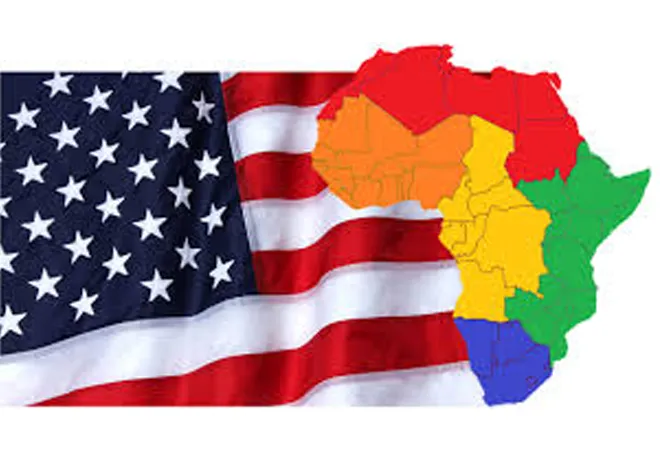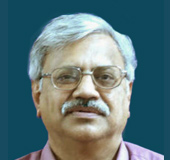
The relationship between the United States of America (USA) and Africa is replete with interesting paradoxes. If the USA was destination of the trans-Atlantic slave trade, it also witnessed the advent of Afro-American President such as Barak Obama (2009-17). Likewise, if the continental organisation like the African Union (AU) has flourished and shown durability, its origins can be traced to 19th century Pan African movement that sprang up in the USA with the ideas and thoughts of W.E.B. Dubois (1868-1963) and Marcus Garvey (1887-1940). When President Donald Trump assumed the office in 2017, certain developments such as his disparaging remarks on migrants, especially African migrants (January 2018) delay in appointing Tibor Nagy as Assistant Secretary of the Department of State (June2018) and his lukewarm interactions with African heads of states such as Buhari (Nigeria), Kenyatta (Kenya) in April and August 2018, respectively, conveyed an impression that he is indifferent to Africa. And yet, it is the Trump administration that has started ‘Prosper Africa’, a signature initiative, which is supported by bipartisan Better Utilisation of Investments Leading to Development (BUILD) Act of October 2018. The Act established International Development Finance Corporation (DFC) and tried to replace and augment capabilities of Overseas Private Investment Corporation (OPIC). The BUILD also doubled the limit on investment from $29 billion to $60 billion under DFC. Although the OPIC was not meant for any specific region, the sub Saharan Africa had its largest portfolio share. The USA is currently in the grip of the Covid-19 pandemic and once the pandemic subsides it will be constrained to restructure its ties with the diverse parts of the world.
In light of this, it may be prudent to examine the USA-Africa ties with reference to stable factors that have anchored them. Several pertinent questions beg answers, in this context. For instance, how multiple dimensions of the USA-Africa ties have shaped in different times? Who were the USA’s principal rivals and friends in the Cold War context? How far security related issues and growing presence of China have mattered in shaping such ties? Will the presence of multiple competing powers add to the bargaining leverage of relatively economically weaker African states? Let me proceed to handle these questions.
The Post War USA emerged as the most dominant imperial power in international relations. However, with the exception of Philippines, the nature of USA’s imperialism has been non-territorial. The USA began to expand its imperial networks with the advent of sovereign independent states in Africa after mid-1950s. Several factors including the context of the Cold War, Afro-American minorities in the USA, Africa’s immense untapped mineral wealth and sites of geo-strategic locations cumulatively shaped the USA’s policies in Africa. Compared to other major areas such as Europe, East Asia, West Asia and Latin America the entire region of Africa, however, has always enjoyed a lower priority within the realm of USA’s interests.
During the Cold War, despite outward support to decolonisation, the USA tacitly supported the imperio racist powers like Portugal, its North Atlantic Treaty Organisation ally, and South Africa in Southern Africa. Colonial Portugal had opened up its colonies in Angola and Mozambique to imperialist exploitation by western multinational firms (MNCs) as well as apartheid South Africa by offering land and contract labour. Factors such as profitable investments in South Africa, Namibia and Angola, geo-strategic location of Southern Africa in the Indian Ocean as well as South Atlantic Ocean and the USA’s military/naval base in at the Diego Garcia in the Indian Ocean that monitored its policy in the Indian Ocean Region (IOR) prompted the USA to back the fortress of white power in the region. The intensification of liberation struggles in Southern Africa backed by the Soviet Union, China and non-aligned states, morally as well as materially, led to independence of Mozambique (1975) and Angola (1976) and termination of white minority rule in Zimbabwe (1980), Namibia (1990) and South Africa (1994). As the processes of liberation were unfolding themselves, the Regan administration (1981-89) had depended on constructive engagement and Sullivan Principles to carry on a dialogue with Pretoria to end apartheid and safeguard the USA’s business interests in Southern Africa.
Furthermore, the Soviet Union and the USA struggled to gain control over the strategic region of the horn of Africa by initially backing Somalia and Ethiopia, respectively. However, with the fall of Hale Selassie regime in Ethiopia 1974 the Soviet backed Mengistu Haile Marriam’s military regime (1974-91) captured power and it embraced ‘red’ revolution. Consequently, the USA began to back Somalia. More than ideological compulsions, strategic considerations weighed in the calculations of both the then superpowers as they swapped allies in the region. Nevertheless, during the Cold War, the USA backed pro-west and overtly pro-capitalist regimes like Zaire/Congo, Kenya, Sudan, Nigeria, Ivory Coast and Liberia. It chose to overlook the dismal human rights records of the dictatorial regimes in Zaire and Sudan. In contrast, the Soviets backed countries that ostensibly preferred some form of socialist alternative such as Ghana, Guinea and Mali in the early 1960s and Ethiopia, Mozambique and Angola in the 1970s and 1980s.
With the end of the Cold War in 1991, the USA was primarily keen on promoting private economic initiatives, democracy, security and development in Africa. However, as it chose to send troops in December 1992, during George Bush presidency (1989-93), to bring about peace among warring clans in strife torn Somalia, the USA lost 18 men in October 1993. Subsequently, during the Clinton regime (1993-2001) the USA participated in the ‘Operation Restore Hope’ carried by United Task Force (UNITAF) under the United Nations involving twenty four nations and 25000 troops. In the operation it lost 35 soldiers. Ever since, the USA was reluctant to involve itself in intrastate conflicts in Africa. However, Clinton regime passed African Growth and Opportunity Act in 2000 (AGOA) which emphasized promotion of the USA’s business investments and trade, reduction of tariff for Sub Saharan African countries on 6500 products, integration among African countries and integration of Africa within the world economy. The AGOA helped the USA’s business companies, especially those related to oil.
The security related issues came to the foreground of the USA’s policies after 9/11 as the USA launched a Global War on Terror (GWOT) under President George W. Bush (2001-2009). Although, Afghanistan was the main theatre of the GWOT, Al-Qaeda had started intensifying radicalisation of Islam through its affiliates such as Al-Shaabab in the Horn of Africa and East Africa, Boko Haram and Ansar Dine in West Africa and terrorist outfits located in Africa’s Sahel region. Apart from establishing a military base in Djibouti to extend its activities through a combined task force in Seychelles, Eritrea and Mauritius, the State Department funded Pan Sahel initiative to boost up the development capacities and hence security of the states like Mali, Chad, Niger and Mauritania. The USA also activated US-Africa Command (AFRICOM) by 2008, which unified and directed security strategy, with its headquarters in Germany. The AFRICOM essentially tried to promote capacity building goals such as economic growth, development, health education and democratic governance to stabilise counter terrorism initiatives. Irrespective of these noble objectives, African countries such as South Africa, Tanzania, Nigeria and Ghana and regional organisations like Southern African Development Community (SADC) were rather hostile to AFRICOM that signified interference of the of external power in the African affairs. Although apparently the AFRICOM sprang up as a response to counter terror, the USA was concerned about its own oil interests in Africa. Thus, the oil rich countries such as Nigeria, Angola, and Sudan and Libya have always mattered to the USA. Besides, the top administrators in the USA were often connected to oil lobbies. Dick Cheney, Vice President (2001-09) was the CEO of Halliburton, Condoleezza Rice, US Secretary of State (2005-09) was Manager of Chavron and Rex Tillerson (2017-18), another Secretary of State, was CEO of the Exxon Mobil and was known for his ties with Putin. What is more, sustained hostility between the USA and Libya had become a hindrance for the USA in gaining access to oil from Libya. During the Arab Spring, under Barak Obama’s Presidency, the NATO allies of the USA intervened militarily in Libya to topple the Gadhafi regime in 2011 and the Obama administration led this operation from behind.
The USA has to contain China’s growing and expansive presence in multiple domains in Africa, especially in the energy sector. China is the largest creditor in Africa and Chinese investment in construction and overall infrastructure was estimated at $2 trillion since 2005 according to American Enterprise Institute (AEI), China’s global investment tracker. China is also the largest trading partner of Africa. The US trade with Africa surged after the AGOA to $100 billion in 2008 but by 2017 it dipped to only $39 while Africa’s trade with emerging economics like India, Indonesia, Turkey and Russia doubled from 2006-2016.
Amidst these multiple actors such as China, the USA, India, EU states, Russia, Japan, Singapore and South Korea etc. that are competing across Africa to woo African countries, the bargaining capacity of the African states has increased. After the Continent of Africa Free Trade Area (AfCFTA) is launched, possibly in 2020, Africa will emerge as the largest single market and allow its entrepreneurs to leverage the advantages that accrue from AfCFTA. Hopefully, the AfCFTA will allow African countries to handle issues related to duty free preferential treatment, tariff and non-tariff barriers, foreign direct investments and development cooperation more effectively with the powers like the USA.
For more arguments, see Harshé, Rajen (2019) Africa in World Affairs Politics of Imperialism, the Cold War and Globalisation (Abingdon, Oxon, Routledge)
The views expressed above belong to the author(s). ORF research and analyses now available on Telegram! Click here to access our curated content — blogs, longforms and interviews.




 PREV
PREV


